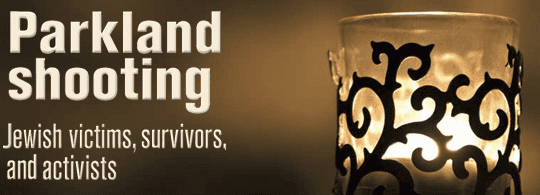The school shooting in Parkland, Florida last month has impacted and mobilized the Jewish community from Florida to Massachusetts and beyond. Consider:
• Five of the 17 killed were Jewish.
• The Sheriff leading the investigation is Jewish.
• The Congressman representing the district is Jewish.
• Youth groups from the Modern Orthodox, Conservative, and Reform movements are signed onto the gun control campaign.
• Hillels are sending students to the March in Washington.
• Congregations in Washington are working to provide food and lodging for marchers.
• And finally, thousands upon thousands are grieving for the loss of all of the victims, including for the families, friends, and communities they were a part of. Life for the survivors will never be the same.
Following, are several pieces from various perspectives on the shooting at Marjory Stoneman Douglas High School.
—Terri Denison
– – – – – – – – – – – – – – – – – – – – – – – – – – – – – – – – – – – – – – –
Here’s why we report on the Jewish victims of general tragedies
(JTA)—In the many years between my first job at JTA and returning as its editor in 2016, I would joke about a headline it published in 1999: “Two Turkish Jews killed in quake.” Perhaps you’ll remember that 17,000 people died in the Turkish earthquake that year. That headline seemed to represent all that was strange and wrong about a narrowly ethnic news service. If they hadn’t identified those two Jewish victims, would the Jewish news service have covered the quake at all—unless to report that “Giant quake narrowly misses Israel”?
Of course, now I am in charge, and we do our version of “Two Turkish Jews” all the time. Last month, following the massacre of 17 students and staff at Marjory Stoneman Douglas High School in Parkland, Florida, our reporters hit the phones, reporting on the victims and survivors who happened to be Jews. We wrote about the two first-year girls who were remembered as sweet and easy-going. The hero teacher who spent his summers at a Jewish camp and died while making sure the last of his students was safe inside a classroom. We wrote about one of those students, a Jewish boy who recalled being the last kid to make it inside before that same teacher was hit and fell bleeding in the doorway.
This practice of identifying the Jewish victims of a greater disaster makes a lot of people uncomfortable, including some of my colleagues. They worry it signals that tragedies only matter to the degree to which they involve a Jew. That it erodes empathy in a diverse world by suggesting that the only thing that matters is tribe. That it makes us look small, in more ways than one.
I share those misgivings but also can defend our search for the Jewish angles, to any general story. First, it is not only the Jews who look for a sectarian connection to any major news event. Maybe we do this more publicly and consistently than other groups, but I doubt it. (Broadway composer Dave Yazbek has a song that asks, “Is it good for baseball, is it good for the Jews?”—it neatly sums up the American Jewish experience in 11 words.) Every local newspaper and television station makes news decisions based on their definition of hometown news. If a plane crashes in Indiana, then it’s news in Chicago if a local person is among the dead. When 230,000 people died in the 2004 Asian tsunami, the BBC took note of the 149 Brits among them.
In a sense I view JTA as a hometown news service, and define the residents of that town not by geography but by their connections to and interest in all things Jewish.
Sometimes this localism lapses into chauvinism—like network Olympics coverage that lasers in on American athletes and ignores the compelling stories of all the other competitors. Or reductio ad absurdumism—like the article I found in an old Billboard magazine pondering the impact of the civil rights movement on pinball machine profits.
But if handled sensitively, localism can also tap into basic human instinct in order to foster a wider appreciation for humankind.
That’s the point of perhaps the best known saying of the first century C.E. sage Hillel: “If I am not for myself, who will be for me? If I am only for myself, what am I? And if not now, when?”
Rabbi Yitz Greenberg suggests that Hillel’s first clause—“If I am not for myself, who will be for me?”—is one of Judaism’s greatest teachings.
“Repair of the whole world starts with my country, my city, my neighborhood first,” writes Greenberg. “Self-interest is legitimate. People work harder and produce more in an economy built on private property. Loved ones or family first is the natural, more human way to operate
This post was originally published in Bossier Magazine, and on the Religious Action Center’s and Union for Reform Judaism’s blogs. It is republished here with the author’s permission.

